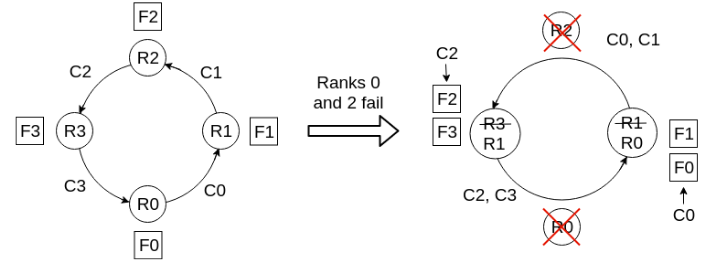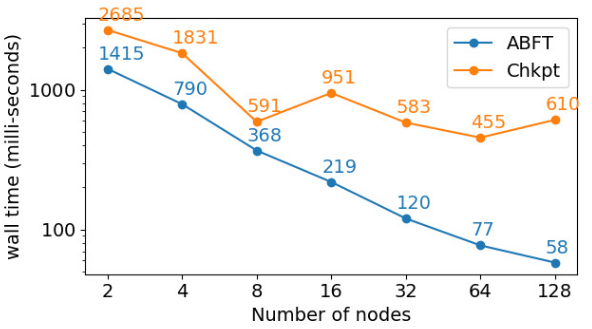Node failure resiliency for Uintah without checkpointing
D. Sahasrabudhe M. Berzins, J. Schmidt.
In Concurrency and Computation: Practice and Experience, pp. e5340. 2019. DOI:10.1002/cpe.5340

Figure 1: Node failures and patch recovery for MPI ranks R0, R1, R2, and R3, with fine patches F0, F1, F2, and F3 and coarse patches C0, C1, C2, and C3. When ranks R0 and R2 crash, the surviving ranks R1 and R3 take over, are renamed to R0 and R1. The surviving ranks now interpolate missing patches F0 and F2 from coarse patch C0 and C2 and continue the simulation.
Abstract
The frequency of failures in upcoming exascale supercomputers may well be greater than at present due to many-core architectures if component failure rates remain unchanged. This potential increase in failure frequency coupled with I/O challenges at exascale may prove problematic for current resiliency approaches such as checkpoint restarting, although the use of fast intermediate memory may help. Algorithm-Based Fault Tolerance (ABFT) using Adaptive Mesh Refinement (AMR) is one resiliency approach used to address these challenges. For adaptive mesh codes, a coarse mesh version of the solution may be used to restore the fine mesh solution. This paper addresses the implementation of theABFT approach within the Uintah software framework: both at a software level within Uintah and in the data reconstruction method used for the recovery of lost data. This method has two problems: inaccuracies introduced during the reconstruction propagate forward in time, and the physical consistency of variables such as positivity or boundedness may be violated during interpolation. These challenges can be addressed by the combination of two techniques: 1. a fault-tolerant MPI implementation to recover from runtime node failures, and 2. high-order interpolation schemes to preserve the physical solution and reconstruct lost data. The approach considered here uses a "Limited Essentially Non-Oscillatory"(LENO) scheme along with AMR to rebuild the lost data without checkpointing using Uintah. Experiments were carried out using a fault-tolerant MPI - ULFM to recover from runtime failure, and LENO to recover data on patches belonging to failed ranks, while the simulation was continued to the end. Results show that this ABFT approach is up to 10x faster than the traditional checkpointing method. The new interpolation approach is more accurate than linear interpolation and not subject to the overshoots found in other interpolation methods.

Figure 2: Performance comparison of the new ABFT method with the traditional checkpointing. The ABFT performs up to 10x faster than the checkpointing.